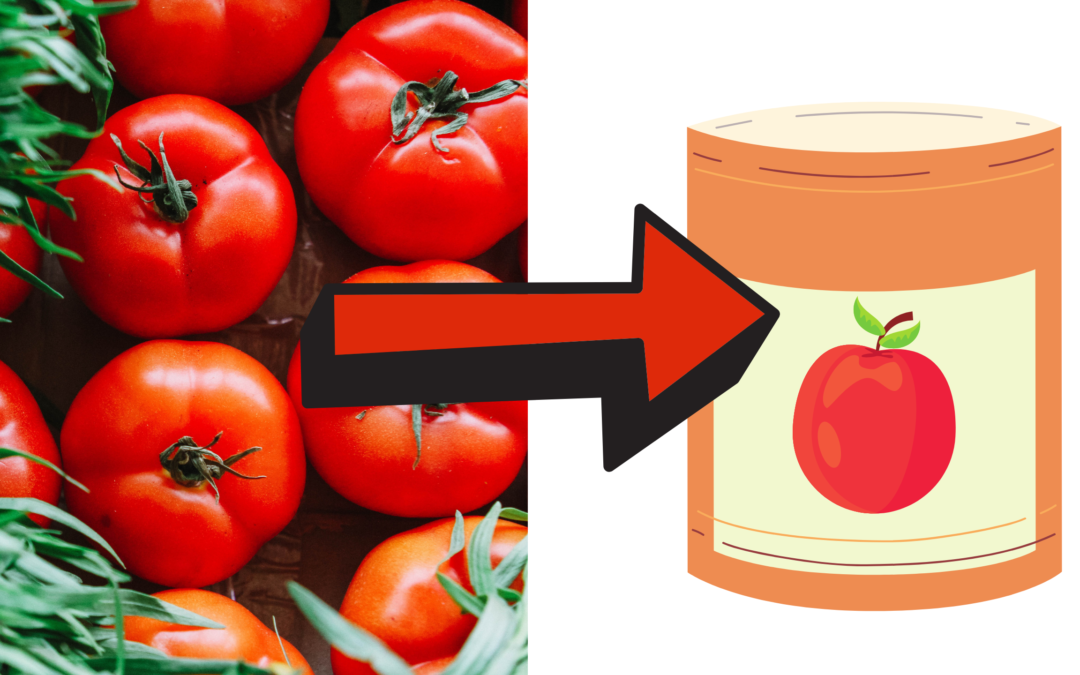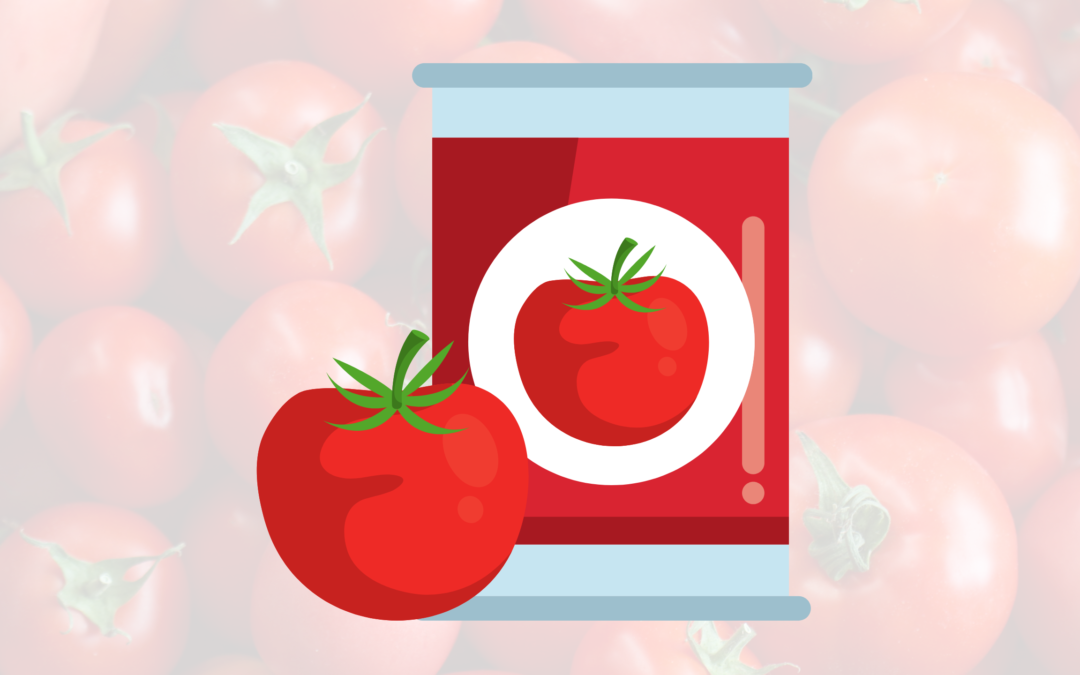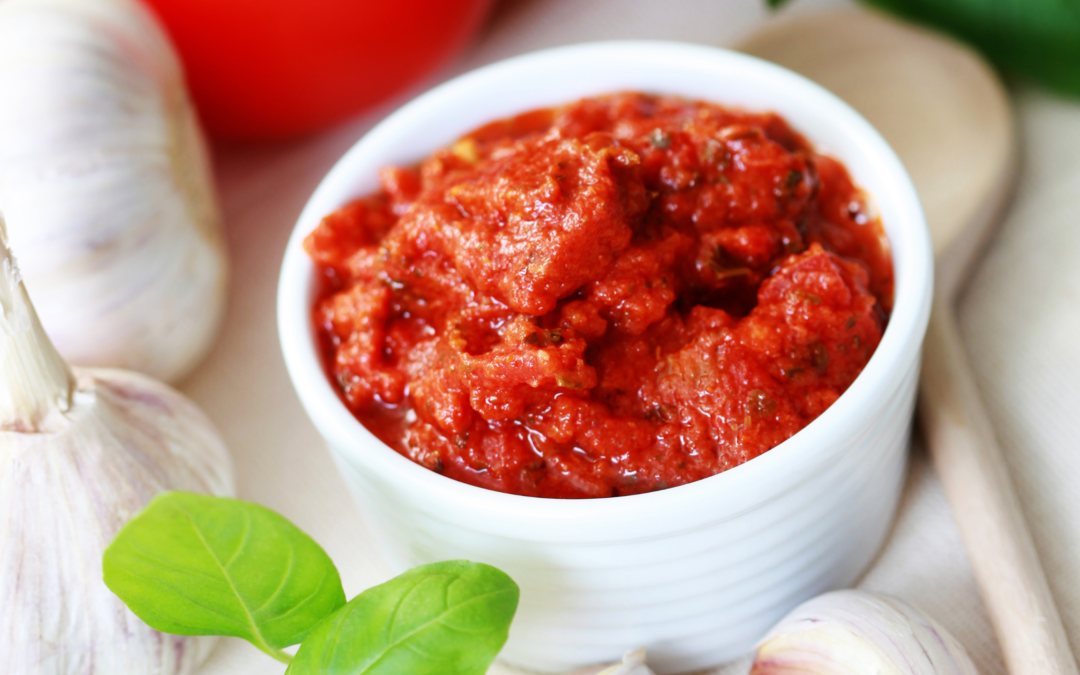
by Tomato Wellness | Dec 20, 2021 | Food and Nutrition, Health, News
Many people purchase fresh produce over canned due to an assumption that it’s better for health. However, this is not always the case! Including canned foods (like fruit and veggies) in your diet can be an affordable and easy way to bump up the nutrient content in your diet. Learn more about how canned foods can be the ticket to a healthy diet.
It is no secret that a diet rich in fruits and vegetables is good for you, as it’s associated with a reduced risk of chronic diseases like heart disease, diabetes, and cancer. However, purchasing abundant quantities of fresh produce may not be feasible for people and can be their biggest barrier to consuming a healthy diet. Additionally, many people view processed vegetables as less nutritious or even unsafe. However, this is a false notion. Processing foods does not automatically imply that it becomes healthy–in fact, it can improve digestibility, nutrient bioavailability, and food safety [1].
You may be asking yourself how canned tomatoes can be part of a healthy diet. After all, did you know that tomatoes are the second most consumed vegetable in the USA [1]? This could be due to their affordability, versatility, and nutritionally dense content from lycopene. This flavonoid provides many benefits, including anti-inflammatory and caner fighting properties. Canned tomatoes have a higher lycopene content than their fresh counterparts because of the canning process. When tomatoes are heated it increases the lycopene content thanks to the cells inside of the tomatoes exploding during the heating process [1]. This allows them to release their compounds which can then be absorbed by our body and used to fight disease!
The next time you stock up on canned goods, don’t forget to pick up a few cans of tomatoes to boost flavor and health! After all, canned foods can be part of a healthy diet.
Learn more about the health benefits of canned tomatoes here:
Lycopene and Canned Tomatoes May Help with Cancer Prevention
Health Connection Between Tomatoes and Lycopene
The link between canned tomatoes and higher nutrition intake
References:
- Wu, X., Yu, L., & Pehrsson, P. R. (2021, October 19). Are processed tomato products as nutritious as fresh tomatoes? scoping review on the effects of industrial processing on nutrients and bioactive compounds in tomatoes. OUP Academic. Retrieved December 16, 2021, from https://academic.oup.com/advances/advance-article/doi/10.1093/advances/nmab109/6403479?login=true

by Tomato Wellness | Dec 14, 2021 | Food and Nutrition, Health, News
What are some of your favorite superfoods? If tomatoes aren’t on that list, then they should be! From cancer-fighting properties to anti-inflammatory benefits, here are some reasons why tomatoes are the new superfood.
When you think of the word superfood what comes to mind? Is it a tomato? Tomatoes are such a commonly eaten food filled with so much nutritional power, yet you may not think of them as a superfood. Not only are tomatoes packed with flavor, but they are also filled with important nutrients like fiber, vitamin C, vitamin A, potassium, calcium and more! One of the most important nutrients that truly makes the tomato a superfood is lycopene.
Lycopene is a powerhouse nutrient because it’s an antioxidant that has been shown to fight chronic disease. In the body, lycopene is mostly stored in the liver, adrenals, prostate, and can also be found in other parts of the body like the brain and skin [1]. As we age or develop chronic diseases, lycopene bioavailability decreases [1]. It is important to continually consume foods that are rich in lycopene such as tomatoes to supply our body with a steady source. Lycopene has been proven to have anticancer, antioxidant, anti-inflammatory, and antidiabetic properties [1]. Additionally, canned tomatoes are shown to have a higher lycopene content than their fresh counterpart. This is due to the heating process that tomatoes undergo during the canning process, as it activates the lycopene and allows your body to absorb and use it more readily.
So, what are you waiting for? The next time you’re at the store go ahead and grab a can (or three) of some canned tomato products to use in the kitchen this week. Need some recipe inspiration? Try out some of our favorites:
Shakshuka Pita Pizzas
Curried Veggie Rice Bowl
Swiss Chard Pecan Lasagna
References:
- Imran, M., Ghorat, F., Ul-Haq, I., Ur-Rehman, H., Aslam, F., Heydari, M., Shariati, M. A., Okuskhanova, E., Yessimbekov, Z., Thiruvengadam, M., Hashempur, M. H., & Rebezov, M. (2020, August 4).Lycopene as a natural antioxidant used to prevent human health disorders. MDPI. Retrieved December 16, 2021, from https://www.mdpi.com/2076-3921/9/8/706/htm

by Tomato Wellness | Dec 11, 2021 | Food and Nutrition, News
Are fresh fruits and vegetables better for us than their processed alternatives? The answer may surprise you! Keep reading to learn more about processed food and its nutrition value.
There are many rumors out there when it comes to the nutrient content of fresh vs processed food. Many believe that “fresh is best” when it comes to fruits and vegetables; however, emerging evidence shows that this may not be true!
During the off season, many fruits and vegetables can become pricy and harder to find in their fresh form. This is where purchasing canned alternatives may be more friendly to both your wallet and your health! One example of this is the tomato. Found in many forms (fresh, frozen, canned, dried, and juiced), processed tomatoes are a good way to enjoy this healthful produce item all year long. In fact, studies show that the nutrition content of canned tomatoes contained significantly higher amounts of minerals such as sodium, potassium, and calcium [1]. Additionally, the vitamin C content of canned tomatoes is higher in canned tomatoes than their fresh counterpart [1].
Another nutrient found within tomatoes that is an antioxidant is called lycopene. Lycopene becomes more bioavailable when heated, therefore it is more prominent in canned tomatoes than fresh. During the canning process tomatoes are heated which activates the disease fighting lycopene. Choosing canned tomatoes can be a great way to incorporate healthy foods in your diet on a budget!
Learn more about the benefits of lycopene with these resources:
Lycopene and Canned Tomatoes May Help with Cancer Prevention
Health Connection Between Tomatoes and Lycopene
What is Lycopene?
References:
- Abdullahi, I. I., Abdullahi, N., Abdu, A. M., & Ibrahim, A. S. (2016, June 25).Proximate, mineral and vitamin analysis of fresh and Canned Tomato. Biosciences Biotechnology Research Asia. Retrieved December 16, 2021, from http://www.biotech-asia.org/vol13no2/proximate-mineral-and-vitamin-analysis-of-fresh-and-canned-tomato/

by Tomato Wellness | Nov 16, 2021 | Food and Nutrition, Health, News
Can eating tomatoes really help lower high blood pressure? Some studies say yes! Keep reading to learn more about the ways in which canned tomatoes have a profound effect on health.
Commonly known as high blood pressure, hypertension is a major risk factor for chronic disease such as heart attack, heart failure, peripheral arterial disease, aortic aneurysm, and chronic kidney disease [1]. Additionally, hypertension is associated with diabetes and high cholesterol, as research shows that hypertension is correlated with oxidative stress [1]. When antioxidants are used in the body, the damage of oxidative stress is lessened.
So how do antioxidants reduce hypertension? It all starts in our endothelial cells (the cells that line our blood vessels). For our blood vessels to relax, these cells secrete a substance called nitric oxide [1]. Unfortunately, harmful compounds called free radicals can attack the nitric oxide and destroy it [1]. Many chronic diseases can occur when there is an imbalance in free radicals and antioxidants. Antioxidants can remove the free radicals and stop more harmful oxidation reactions from occurring.
Studies have found, that while antioxidants can have a positive effect on hypertension, it is only seen when the antioxidants come from diets high in fruits and vegetables, but not from antioxidant supplements. It’s theorized that this is because fruits and vegetables contain a wide variety of antioxidants that work together and create a powerful chain of antioxidants [1]. That’s why we love canned tomatoes! They are rich in antioxidants, and contain lycopene in addition to other phytochemicals (like beta carotene) that can work together to prevent disease.
So, go ahead and boost your health with canned tomato products! They are shelf stable, easy to use, and contain a more bioactive form of lycopene compared to fresh tomatoes. What’s not to love?
Learn more about the benefits of lycopene with these resources:
Lycopene and Canned Tomatoes May Help with Cancer Prevention
Health Connection Between Tomatoes and Lycopene
What is Lycopene?
References:
- Baradaran, A., Nasri, H., & Rafieian-Kopaei, M. (2014). Oxidative stress and hypertension: Possibility of hypertension therapy with antioxidants. Journal of Research in Medical Science, 19(4). Retrieved November 15, 2021, from https://www.ncbi.nlm.nih.gov/pmc/articles/PMC4115353/.

by Tomato Wellness | Oct 5, 2021 | News
Aging causes a decrease in cognitive decline, but you may be able to stave off the effects based on what you eat. A decline in cognitive function (such as Alzheimer’s disease) may be prevented through good nutrition, so read on to learn more about how canned tomatoes play a role in brain health.
It’s no secret that with aging comes a decrease in cognitive function. Alzheimer’s disease is one of the leading causes of dementia, and comes loss of memory, language, problem-solving and other skills related to critical thinking [1]. However, did you know that it is possible to prevent cognitive decline with a healthy diet?
Without protection, the aging process can bring on free radicals and inflammation that wreak havoc and can even lead to diseases such as dementia [1]. However, certain properties within food can provide a protective effect to our cells, as antioxidant phytochemicals can remove free radicals and reduce inflammation within the body. One of these powerful antioxidants is lycopene, which is found in tomatoes. Studies have shown that low levels of lycopene within the body can leave you at a greater risk for disease, which is why eating foods rich in this antioxidant is beneficial for health. Researchers are also currently studying the specific effects that lycopene has on cognitive function, as there have been associations between lower circulating lycopene and higher rates of Alzheimer’s disease mortality [1].
While lycopene can be found in any type of tomato, it is particularly concentrated in canned tomato products. When tomatoes go through the canning process, they are heated, which increases the body’s ability to absorb lycopene.
Including canned tomatoes in your weekly recipes is a great way to promote good healthy and protect your body from signs of aging. So, what are you waiting for? Enjoy all the flavors and health benefits that canned tomatoes have to offer by trying some delicious new recipes.
Check out some delicious recipes featuring canned tomatoes:
Pan Seared Pork Chops with Bourbon Peach Compote
Easy Chicken Curry
Pizza Stuffed Chicken
The BEST BLT Dip
- Crowe-White, K. M., Phillips, T. A., & Ellis, A. C. (2019). Lycopene and cognitive function.Journal of Nutritional Science, 8. https://doi.org/10.1017/jns.2019.16

by Tomato Wellness | Sep 22, 2021 | News
Lycopene rich foods may have the ability to prevent central nervous system disease. This carotenoid found in tomato products may be the secret to preventing disease like Alzheimer’s and dementia. Learn more about what science has to say about lycopene rich foods and preventing disease.
It has been proven many times that lycopene (a carotenoid found in tomatoes) is an amazing antioxidant and anti-inflammatory agent that can help to reduce disease such as heart disease, fatty liver disease, prostate disease, and type 2 diabetes. However, it is lesser known that lycopene may also have neuroprotective effects in the central nervous system [1].
Studies have found that lycopene can reduce oxidative stress, neuroinflammation, neural apoptosis, and to restore function of the mitochondria. Lycopene has shown that is has neuroprotective effects, and while evidence has found lycopene supplementation can improve cognitive performance, further research may be able to prove the positive effects on the central nervous system [1]. This would allow lycopene and foods that contain lycopene to be used to prevent or treat disorders of the central nervous system. However, one drawback to using foods that contain lycopene to treat these diseases and disorders is the low bioavailability of lycopene. In some foods it may be too low to raise the level within brain tissue. However, higher concentrations of lycopene (like in a supplement) have been shown to have toxic effects [1].
Canned tomato products could possibly play a role in the treatment of central nervous system diseases and disorders. While some foods may not contain adequate levels of lycopene and would not be effective as a treatment, canned tomatoes have increased bioavailability of lycopene due to heating during processing. While further studies need to be done to prove that canned tomato products could be used in this way, it is a possibility. At the very least, we know that canned tomato products are an excellent addition to the diet and have already been proven to prevent many other diseases.
Learn more about the benefits of lycopene with these resources:
Lycopene and Canned Tomatoes May Help with Cancer Prevention
Health Connection Between Tomatoes and Lycopene
What is Lycopene?
References:
- Chen, D., Huang, C., & Chen, Z. (2019). A review for the pharmacological effect of lycopene in central nervous system disorders.Biomedicine & Pharmacotherapy,111, 791–801. https://doi.org/10.1016/j.biopha.2018.12.151






Recent Comments